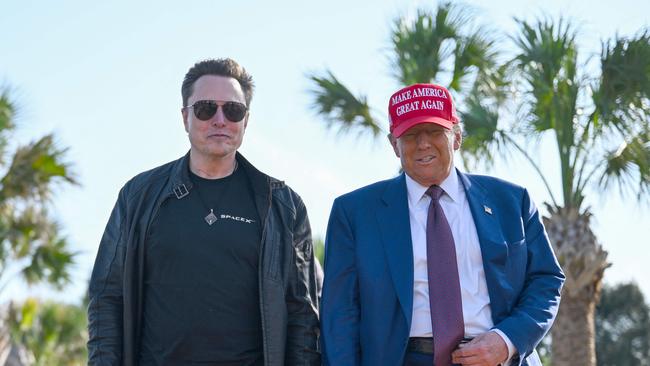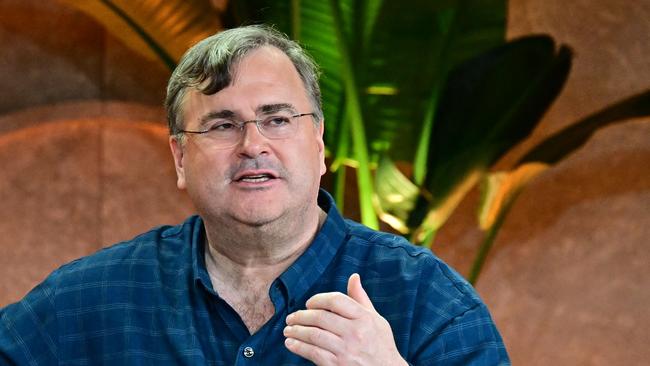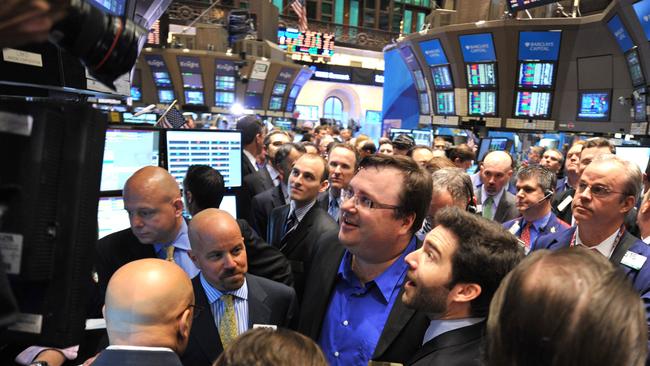Reid Hoffman: I’ll stay in the US to fight Trump and Musk
LinkedIn founder Reid Hoffman denies that he’s considering leaving over fears of what the President-elect might do to him.

Reid Hoffman’s director of security has the iron-grip handshake of a man you would not want to cross. “We’re ready,” says the sharp-suited American muscleman, who leads me to a stuffy box room in the corner of the London office where his boss has set up camp for the afternoon.
At first glance, Hoffman does not have the appearance of a man in need of a security detail. I find the LinkedIn co-founder in a short-sleeved blue work shirt and a pair of beige chinos, finishing off a takeaway lunch. In front of him is a scruffy little black notebook that he uses to scribble down his thoughts and ideas.
But Hoffman, 57, has reason to be cautious. He has recently established himself as a sworn enemy of two of the world’s most powerful men: Donald Trump and Elon Musk. A Democrat mega-donor, he blames his former friend Musk - whom he now describes as “nutty”, “immoral and irresponsible” - for inciting recent threats of violence against him with provocative social media posts.
Hoffman is one of the kings of Silicon Valley, an overachiever even by the standards of San Francisco’s Bay Area. As the founding boss of LinkedIn, the geeky but increasingly ubiquitous professional social network, he became a billionaire in 2016 when he sold out to Microsoft, joining the tech giant’s board in the process.
He was one of the first venture capitalists to invest in Facebook, and remains a confidant of Mark Zuckerberg - “We WhatsApp each other, we have meals on occasion” - while his investment firm, Greylock, has backed start-ups including Airbnb and Coinbase. Hoffman was also a founding investor in OpenAI and sits on the board of Inflection AI, the company behind Pi, which it claims is the world’s first “emotionally intelligent” assistant.
But before all that, he was part of the fabled group of entrepreneurs who launched PayPal in the late 1990s. Peers included the libertarian investor Peter Thiel (still a friend) and Musk (emphatically, no longer a friend). Collectively, they are referred to by fans and fellow techies as the PayPal Mafia. But Hoffman, a self-styled “people person”, who I find accommodating almost to a fault, seems to flinch at this label. Problem? “It’s like ...” he takes a deep breath ... “we weren’t doing anything criminal, right?”

During a short trip to the UK, he has delivered two speeches on artificial intelligence, one of which was attended by former prime minister Rishi Sunak. He found some time for The Sunday Times during a visit to the offices of Brent Hoberman’s Founders Forum, a tech start-up hub, in Aldwych, central London.
We meet with a political sea change sweeping over Hoffman’s homeland, as President Biden prepares to hand over power to his election nemesis. Several luminaries of US tech have welcomed Trump’s victory; Hoffman isn’t among them. In fact, he believes, there are “tons” of business leaders who fret about the future under Trump but won’t speak up because they are “fearful of retaliation”.
Last month, The New York Times reported that Hoffman was weighing up whether to emigrate from the US over fears of what Trump might do to him. On several occasions, the president-elect has spoken of a desire to take revenge on political adversaries. And Hoffman is up there. Not only did he donate millions of dollars to the Kamala Harris campaign, he even helped fund E Jean Carroll’s rape and defamation lawsuit against Trump.
“It’s important that rich, powerful men cannot sexually assault women, slander them, and get away with it,” he says. Carroll won the case and was awarded over dollars 80 million in damages. Trump is appealing against the verdict.
So, is he about to flee? “I was talking to some friends about how I’m planning to spend more time in the UK next year - and that generated a rumour that I’m moving,” Hoffman explains. The truth? “I’m staying,” he says. “It’s important, in times like this, that you stand up and try to keep your country on the right track.”
Hoffman confirms he is worried that Trump may “abuse” his position to enact “political retribution”. He posits the idea that the president-elect could demand “massive” tax investigations into his enemies, or use his podium to promote “falsehoods and slander”.
Hoffman also finds himself in the crosshairs of Musk, who poured more than dollars 250 million into Trump’s campaign and will take charge of his Department of Government Efficiency. Hoffman and Musk used to be friends, as well as colleagues? “Yes,” he says shortly. And now? “It’s hard when someone is generating completely slanderous lies that end up resulting in crazy MAGA people sending you threats of violence.”
The dispute with Musk relates to Jeffrey Epstein, the infamous sex offender who died by suicide while awaiting trial in 2019. Many high-profile men had dealings with Epstein, both before his 2008 conviction for soliciting prostitution, and afterwards. In 2019, Hoffman said he regretted having “helped to repair” Epstein’s reputation by introducing him to other tech bigwigs as late as 2015, while seeking donations for the Massachusetts Institute of Technology (MIT). Hoffman says he was told Epstein had passed MIT’s “vetting process”, which is surprising given his notoriety. “My lesson is I should go do my own research,” he adds.
He says he “went to no Epstein parties” and, despite his infamy, “didn’t even know who he was”. There is no evidence to suggest otherwise. But this has not stopped Musk from insinuating, mostly on his X platform, that there was more to the relationship than meets the eye.

Hoffman thinks Musk’s conspiracy theory was seeded when he invited his old friend to an MIT fundraising dinner that was also attended by Epstein in 2015. He believes Musk has since developed a “conviction with no evidence” that “Reid Hoffman was a client of his”.
“Elon’s defamation makes me angry and sad,” he adds. “Angry because it is an ugly assault. Sad because it comes from someone whose entrepreneurial achievements I continue to admire.” He does not wish to “dignify” the threats he has received by providing details, but confirms: “I’ve hired security staff as a result.”
Hoffman was born an only child in the Californian city of Palo Alto. His parents, both lawyers, divorced when he was one. He later convinced them to send him to the Putney School, a “progressive” boarding school in Vermont. He went on to study at Stanford University, in California, before completing a masters in philosophy at Oxford. After starting his career as a user-experience designer at Apple, Hoffman co-founded SocialNet, an unsuccessful dating site, followed by PayPal and then, in 2003, LinkedIn.
His lifestyle now is offbeat. He doesn’t “have a notion of weekends”, drinks up to ten cups of coffee a day and has started going to the gym to improve his physical health. He also takes Ozempic, the weight-loss drug. “I’m still overweight,” he says. “But, like, now I could run up ten flights of stairs and not be dead.”
Hoffman and his wife, Michelle, a former clinical speech pathologist, decided against having children to pursue their careers. “Neither of us is tied to our biology,” says Hoffman, who explains that he aims to have a “meaningful life” by contributing to the “journey of humanity”. It’s clear he feels LinkedIn has been a big part of that. “There have been many millions of people who have substantially changed their own lives because of it,” he says, proudly. “You find a great new job; you find a co-founder for a business; you find a sales prospect. There’s all kinds of things.”
BrewDog founder James Watt recently memorably announced his engagement, or “long-term contractual agreement”, on LinkedIn. I put it to Hoffman that his creation can be a bit “cringe” at times.

The c word seems to rile Hoffman, who mistakenly believes I am referencing a comment made by Musk. “Well,” he huffs, “I will take a contrast of what is more cringey between LinkedIn and Twitter any day ... No Russian conspiracy theories. No vaccine conspiracy theories. You know, people being much more civil with each other ... If that’s what cringeworthy is, I’d welcome it.”
Hoffman has been dubbed Silicon Valley’s best-connected man. Mustafa Suleyman, Microsoft’s AI who co-founded Inflection with Hoffman, describes him as “one of the most important figures in the global tech industry - he has a humanist vision of the world and a plan for how technology can help get us there”.
Hoffman waxes lyrical about the UK’s tech talent. But the man who wrote the book Blitzscaling, a guide to building a company at lightning speed, believes the UK could show more “ambition”, saying would-be entrepreneurs need to overcome “the embarrassment of failure”.
“You’re measured by your successful bats,"says Hoffman, deploying a baseball analogy that neatly translates into cricket. “Not your unsuccessful ones. So keep batting, right? And go hard for it.”
Hoffman believes regulators will play a key role in determining which regions are able to advance AI technologies. He suggests that the attitude of European regulators, including the UK’s Competition and Markets Authority, is roughly: “We’re going to try to eliminate anything bad happening in the future.” While there are plenty who believe AI should be developed with considerable caution, Hoffman thinks Europe’s approach will slow down innovation, while China, the US and other nations leave it behind.
He is considering renting or buying a house in Britain and, despite these criticisms, is something of an anglophile. But what is it that he really likes about Britain? He reels off a long list that includes history, politeness, breakfast at the Ritz, London’s theatre district and our “high-functioning intellectual discourse”. Plus, he adds, gesturing to the dreary cityscape outside: “I love grey, short days.” Really? “No,” he says with a giggle. And with that comes confirmation that Hoffman truly is an overachiever: an American who has mastered the dry British sense of humour.
THE TIMES



To join the conversation, please log in. Don't have an account? Register
Join the conversation, you are commenting as Logout